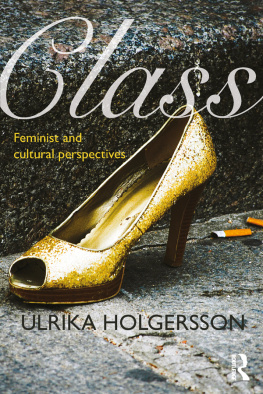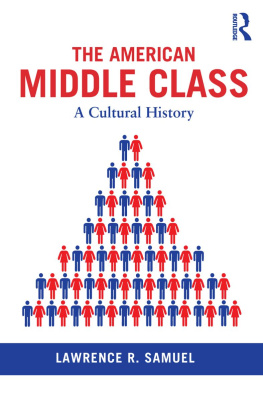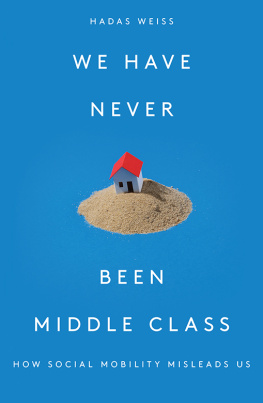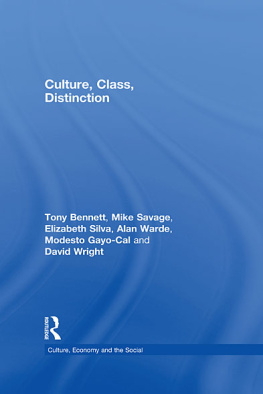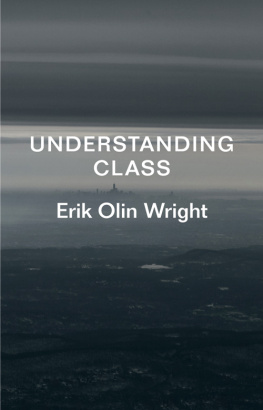CLASS
There is hardly any discussion of class that does not in some way relate to the theories of Marx and Weber. So profound was the impact of their ideas, that their writings are often perceived as the only original and most reliable interpretations of class society. But Marx and Weber were neither the first, nor last, to talk about class and they did so based on the specific conditions prevalent in their own communities. Class explains this complex field using cultural, sociological, and feminist perspectives. It deepens our understanding of the problems of class and uses illuminating examples from media, popular culture, and literature that explain current class analysis. Class is an elegant, lucid and comprehensive introduction that broadens our understanding of the concept and the immense power that it exerts by way of in- and exclusions.
Ulrika Holgersson is an Associate Professor of History at the Department of History, Lund University, Sweden. She is a cultural and gender historian, with media and popular culture as specific areas of expertise. Her publications include Popular Culture and Classification. The Discourses of Work, Class, and Gender in Swedish Womens Magazines at the Beginning of the Twentieth Century (2005) and The Servant Maid and the Feature Film. Stars of the Swedish Folkhem of the 1930s and 40s (2016).
Holgerssons book makes an ideal introduction to a complex subject for students of both history and sociology. It combines lucid summaries of classic theories of class and of the postmodern debate about discursive construction with vivid examples from contemporary popular culture and original observations about class and gender.
Peter Burke,Emmanuel College Cambridge
Class does not go away, it only changes name and form. This book recognises this handsomely. It is lively, accessible, and thoughtful in equal measure. It moves with the times, and therefore does justice to the changed times of class, revisiting old themes in a new way and opening up much new ground.
Patrick Joyce,Emeritus Professor of History, University of Manchester,
Honorary Professor, University of Edinburgh and
Visiting Research Fellow, Trinity College Dublin
First published 2017
by Routledge
2 Park Square, Milton Park, Abingdon, Oxon OX14 4RN
and by Routledge
711 Third Avenue, New York, NY 10017
Routledge is an imprint of the Taylor & Francis Group, an informa business
2017 Ulrika Holgersson
The right of Ulrika Holgersson to be identified as author of this work has been asserted by her in accordance with sections 77 and 78 of the Copyright, Designs and Patents Act 1988.
All rights reserved. No part of this book may be reprinted or reproduced or utilised in any form or by any electronic, mechanical, or other means, now known or hereafter invented, including photocopying and recording, or in any information storage or retrieval system, without permission in writing from the publishers.
Trademark notice: Product or corporate names may be trademarks or registered trademarks, and are used only for identification and explanation without intent to infringe.
Every effort has been made to locate the copyright owners of the material, but if any have been inadvertently overlooked the publisher will be pleased to make the necessary arrangements at the earliest opportunity.
British Library Cataloguing in Publication Data
A catalogue record for this book is available from the British Library
Library of Congress Cataloging-in-Publication Data
Names: Holgersson, Ulrika, 1972- author.
Title: Class: feminist and cultural perspectives/by Ulrika Holgersson.
Description: Abingdon, Oxon; New York, NY: Routledge, 2016. | Includes
bibliographical references and index.
Identifiers: LCCN 2016010197 | ISBN 9781138886827 (hardback) |
ISBN 9781138886834 (pbk.) | ISBN 9781315714561 (ebook)
Subjects: LCSH: Social classes. | Social conflict. | Feminist theory.
Classification: LCC HT609.H63 2016 | DDC 305.5dc23
LC record available at https://lccn.loc.gov/2016010197
ISBN: 978-1-138-88682-7 hbk
ISBN:978-1-138-88683-4 pbk
ISBN:978-1-315-71456-1 ebk
Typeset in Bembo
by Sunrise Setting Ltd, Brixham, UK
This book is the result of my own need for a comprehensive theoretical review of what is a vast and often incomprehensible field. In that sense, I have written it as much for myself as for anyone else. The perspective is mine. Unavoidably so, of course, as I have examined the history of class from my particular vantage point in order to suggest a model of class and how best to analyse it.
Three of my colleagues at the Department of History in Lund have read and commented on my first manuscript in Swedish. Eva sterberg offered sage advice on the Introduction and the third chapter. Lars Berggren not only suggested many improvements, but also was encouraging in his belief that this was an important book that needed to be written. I have also benefited hugely from Lars Edgrens formidable knowledge of the field. My students studying for a Masters in Historical Studies at Malm University and the Graduate School of History at Lund University have read parts or all of the manuscript and have been a source of valuable comments. Later on, Marianne Thormhlen and Johanna Esseveld encouraged me to get the book translated into English and Charlotte Merton conducted this transformation, as carefully as ever. The translation was funded by The Swedish Foundation for Humanities and Social Sciences (Riksbankens Jubileumsfond). My thanks to you all.
My husband, Martin strm, has been my rock. For you, Amanda, and Hjalmar, a special family hug. The English version of the ice cream book is finished.
The quotation from the work The Making of the English Working Class by EP Thompson, was kindly reproduced with permission of the Orion Publishing Group, London. This work was first published in 1963 by Victor Gollancz publishing.
Ulrika Holgersson
Brussels, November 2015
1
INTRODUCTION
There are social, material, and cultural differences between people, and have been ever since human societies first emerged thousands of years ago. In the Christian tradition, which was heavily influenced by Greek philosophy, the differences were long seen as not only necessary, but as God-given (Calvert 1982: 267). At the same time, human history has always been punctuated by flashes of revolt, overlaying strong currents of resistance from those who are deeply dissatisfied with inequality.
Although the differences have always been there, the ways in which they have been discussed and understood have shifted over time. Today, the usual name for social inequality is classin everyday English, I should perhaps add, for there is precious little consensus about the word among academics. In some circles in the seventies, that heyday of historical materialism, class was something approaching a law of nature. By the end of the eighties, as industrial society and the Berlin Wall alike were being hastily dismantled, many had declared it completely deadwhen communism as a political order passed into the grave, few were prepared to countenance the idea that all-inclusive models and collectivist systems could be a valid mode of research.

